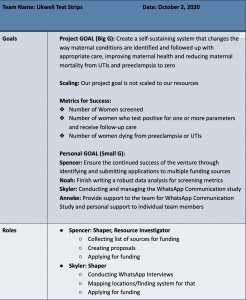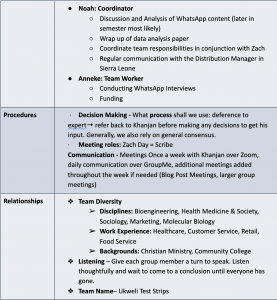Individual Portion:
- We are maintaining regular communication with each other and having much less frequent instances of gaps in communication (although this has occurred with some group members recently).
- We are able to have honest and thoughtful discussions with each other in a respectful way. This means having tough discussions in a respectful manner (i.e. if someone isn’t doing their part, we are able to discuss that in a constructive manner).
- Each of our friendships with each other has strengthened as time went on. We each feel a strong working relationship that has developed into lifelong friendships with each other. This helps us work harmoniously.
- I have taken more of a leadership role within the team throughout the summer and now in the fall semester. I feel that the team trusts my judgement and I trust theirs. This is incredibly important when performing any type of teamwork.
- I learned that not everything is task-oriented. There is a “give-and-take” aspect to working with people. Sometimes it is best not too push people too hard, other times it is better to force an issue. I.e. “pick your battles”. No situation is black and white, and this just comes with experience.
- Meaningful relationships are the most important aspect to accomplishing the venture’s goals. People are much more receptive to you when you come from a place of caring, integrity, and respect for others. By showing this aspect first, you are much more likely to achieve meaningful results.
- I don’t feel any one group member feels the need to “shoulder the responsibility” for the whole group on specific tasks. During the spring semester, some group members felt the need to do everything by themselves if something wasn’t done by a deadline. This semester, however, we have decided to know when to take a “hands-off” approach and strategically allow certain things to fail. Otherwise, we are enabling a lack of accountability. Paradoxically, letting things fail in the short term has led to more long-term successes.
- A skill I have developed is knowing how to trust my team. In a fiercely independent society (at least in America), the attitude of “if you want something done right, you need to do it yourself” was my mantra. Since working with the team, I have learned that, although it may sometimes be the case, you need to provide your teammates with the opportunity to prove you wrong. If you do not provide that opportunity, you will be left alone to do everything yourself. With the issues we are attempting to solve, it is impossible to accomplish much of anything as an individual person simply because of how much work there is.
- We are all much more responsive to communications from the distribution manager in Sierra Leone. Generally, someone will respond to his messages within an hour or two at the most, but more often than not one of us will respond within a few minutes. This is imperative for the work we do, because things tend to move a bit slowly when coordinating with the team in Sierra Leone due to a variety of factors, including limited internet connectivity.
- We all feel empowered to do our work. In the beginning, it was easy to feel either unappreciated or misunderstood, but after having several tough conversations with each other and working closely together for an extended period of time, I believe that nobody in the group feels that our work is “work”. We each enjoy doing what we do for the greater good.
Collaboration Plan:


